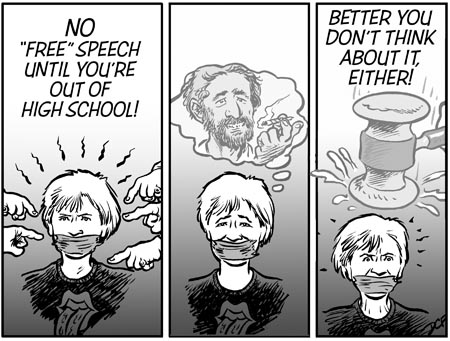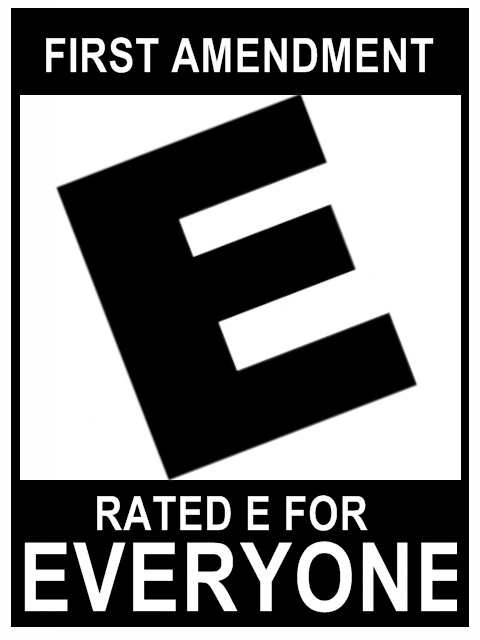13.4.09
First Amendment Test
Wow...I received a 19 out of 30 possible correct answers! Oh no!
That is shocking to me because even though we covered basically every topic in class I was still very confused about my rights. I think that I had put more faith in the First Amendment then I should have. I learned that I can still be degraded verbally about my gender and ethnicity and that the harsh words used against me are protected under the United States Constitution. I really enjoy the freedom I receive here being a United States citizen from birth. But this type of quiz makes me wonder, how much is too much? I am 18 years old and now just beginning to comprehend how I can use my freedoms and how they can be used against me. I feel like I should have had a much better understanding of these rights before I moved away from or. Or even before I began high school for that matter. If I have children in the U.S. I want to give them these facts a lot earlier then I knew about them.
Key
"16 to 20: Well the good news is that you don't need to pass a test or obtain a license to use the First Amendment. Still, we hope you'll spend a bit more time looking into the First Amendment's essential freedoms and how they apply. C'mon -- it's only 45 words!"
Bong Hits for Jesus

The Evening News Report:
In breaking news this evening the results for the free-speech student rights's case has just been sent to our news room. In the Supreme Court Case Morse v. Frederick, simply referred to as "Bong Hits for Jesus", the United States Supreme Court has ruled 6-3 in favor of the Juneau School Board. The events leading up to this final decision occured as such...
-On January 24, 2002, students from Juneau-Douglas High School were permitted to attend the passing of the torch for the 2002 Olympics. Together various public high schools gathered to witness this triumphant event in Alaska's history. 18 year old Joseph Frederick decided that this would be a good time to express his free speech rights and he unfurled a banner reading, "BONG HiTS FOR JESUS". Frederick and some friends purposely waited until television cameras were present at the event to present this message not only to Juneau but the world. The principle of the high school, Deborah Morse, was outraged by the students' rebellious actions. She immediately took the banner down and proceeded to suspend Frederick for five days due to his actions. She claimed that the banner violated Juneau-Douglas' substance free policies and eventually upped his punishment to ten days. Frederick appealed his suspension twice, once he appealed directly to the school and had no luck and then he appealed the to the Juneau School Board who was more sympathetic to his case.
-On April 25, 2002 Frederick filed a civil rights law suit against Morse and the entire school board. This suit was dealt with in the United States District Court of Alaska. The young man claimed that his suspension violated his First Amendment as protected under the freedom of speech clause. The District Court ruled in favor of the establishment over the student because his message promoted drug use.
-The Ninth Circuit then took the case and ruled in favor of Frederick. They decided that because Frederick was at a school sponsored event and because his banner was taken down his rights were in fact violated. Student's rights are respected by public schools in school and even though it did not take place with in the confines of Juneau-Douglas property Frederick's rights should have been respected on a field trip.
Finally today, March 19, 2009, Chief Justice Roberts wrote up the decision which choose that the school board did not, I repeat did not, violate Frederick's rights. Taking down his banner was good because it was an obvious drug reference and because they were at a school sponsored event his rights were limited the to the type of speech allowed within the school. During the in court discussion reference was made to the Tinker v. Des Moines case. In this case the Supreme Court ruled in favor of the three student who wore black arm bands to school in a protest again the Vietnam War. The court again decided that these decisions did not work together because pro-peace messages and pro-drug messages are in two different levels within the Constitution.
For more on this case watch our late night report where we will be interviewing Joseph and his family about there opinion on the event. Now to Susan with the sports...
12.4.09
Quotes
Or more so, will the stand
Against evil ever end?
Let’s hope not.
The world cannot allow evil to triumph.
We cannot sit by and do nothing.
Will the good men ever sit down?
Let’s hope not.
Does it take just one good man
To sit down and ignore the fact
That evil will never surrender
For the rest of the good men to follow?
Let’s hope not.
Evil surrounds us.
It is ubiquitous.
Thus, have faith in the good
So that evil shall never conquer.
Let’s give this new era hope
And have faith in the one man
That has taken a stand
To let evil to never triumph.
Flag Burning


Since the 1989, Texas v. Johnson, flag burning has been a legal form of protected speech under the Constitution. While there are many that oppose this action and who have attempted to amend the Constitution to favor flag burning, I believe that this rght should be protected. Like Penn and Teller, I too fell that an actual flag is only a superficial, material representation of the United States. Opponents of flag burning claim that in burning the flag people are destroying the principles upon which our country stands: liberty, freedom, and independence.
Freedom of Religion

This posed great problems for the Rastas, who use a drug called cannabis, Ganji, or most colloquially known as marijuana as a spiritual action, often accompanied by Bible study. To the Rastafarian, cannabis is known as the "healing of the nation," "ganji," or "herb," and is considered a sacrament in their religion for cleansing both the body and mind, healing the soul, exalting the consciousness, and propelling the peace and please that subsequently brings the, closer to Jah. It is essential to burn the herb "for it will sting in the hearts of those that promote and perform evil and wrongs." While smoking Ganji has now become part of the stereotype surrounding the Rastafarians and they do see it in a positive light, there is no mandate for it to be used during worship. Which is fortunate, seeing how the courts have deemed that marijuana use, even for spiritual purposes by Rastas, is illegal.

Many Rastas claim that cannabis is part of a reclamation of their African culture. In the 18th century, cannabis, at that time and place known as dagga, was first introduced to Central and Southern Africa by Arab traders. For this reason, many Rastas see the illegality of cannabis as s a validation of their belief in the persecution of the Rastafarian. This does not mean that they are surprised by its illegality, because they believe that Babylon system is afraid to unleash the power of the cannabis, its' ability to open the mind of the mortal to the truth. In no way do they view, their healing herb as similar to alcohol and other drugs; the distinction lies in the marijuana's ability to open the mind, and the converse detrimental destruction of the mind that occurs under their substances. They have quotes from the bible that they view sanction the justification of the drug's use, holding too that the etymology of the word cannabis" comes from the herb God mandated Moses to use in preparation of the sacred anointing perfume in Exodus 30:23.

Nonetheless, Rastafarians are liable for arrest under the drug laws if caught using marijuana. The once-Attorney General of the U.S. Janet Reno made a statement in 1998 citing the smoking of marijuana as a violation of the U.S. drug laws, and promulgating that Rastafarians did not have the religious right to smoke ganja. This opinion is shared in the United Kingdom, where the Court of Appeals in the R.v. Taylor 2002 postulated that the prohibition did not interfere with the Freedom of religious rights stated and protected under the Convention for the Protection of Human Rights and Fundamental Freedoms.

These laws governing religious marijuana use may change in the future. The Italian Supreme Court has already done so, legalizing Rasta marijuana use, citing it as a sacrament in 2008. My personal beliefs lean toward the Libertarian. I see marijuana as the most harmless of drugs, and wouldn't really have a problem if it was legalized as long as restrictions were imposed. With that said, I am a complete supporter of the government, and as the law stands, I believe that no one should smoke and if caught should take the full consequences. Personally, I like to always be in control of my actions and the use of any psychoactive drugs, religious or recreational, at any time is entirely against my personal morals, values, and principles. In 1994 only, the War on Drugs laws and policies led to the incarceration of over one million Americans, 225,000 of which were in possession of marijuana. That number has remained fairly constant over the last couple years.

